Dental Bridges – Jenks, OK
Close the Gap in Your Smile
Losing one or more teeth can impact your daily quality of life in a few different ways. Not only are you less able to eat and speak like you used to, but you’re likely also feeling self-conscious about your appearance. Fortunately, our experts at Elwood Avenue Dental can close the gap in your smile with a beautiful dental bridge. Feel free to contact us if you have questions or would like additional information and we’ll be happy to assist you.
Why Choose Elwood Avenue Dental for Dental Bridges?
- In-House Savings Plans and Financing Available
- Digital Imaging & Impressions to Enhance Patient Comfort
- High-Quality, Tooth-Colored Materials
What is a Dental Bridge?
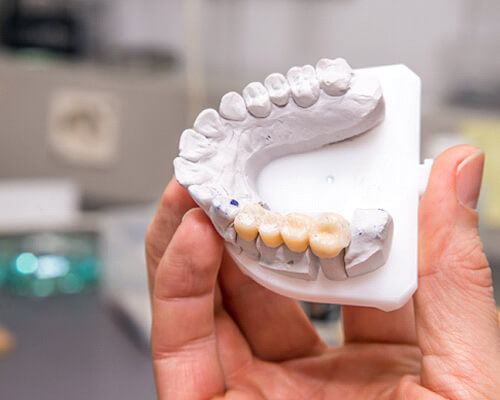
A dental bridge is a permanent oral prosthetic that can replace one or several consecutive missing teeth. It contains the designated number of false teeth, or pontics, and is anchored to your natural teeth on either side using dental crowns or stabilized with the assistance of dental implants. This restoration can be color-matched to your smile so that no one can tell that it’s there. It keeps your remaining teeth from shifting out of alignment and restores much of your ability to eat and speak more normally after tooth loss.
Types of Dental Bridges
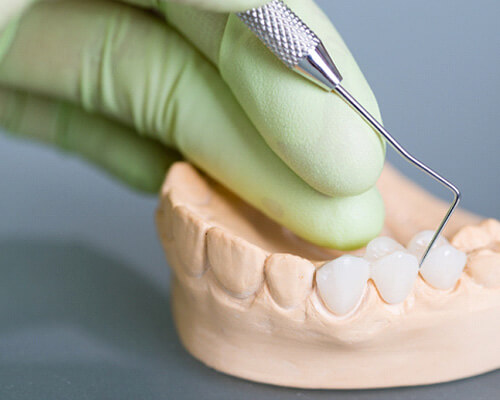
Before you can be fitted with your dental bridge, you need to have a consultation appointment with one of our experts. We’ll examine your teeth and gums to ensure no disease or decay is present. Based on our findings, we’ll recommend the appropriate type of dental bridge for you. The two options are:
Traditional Dental Bridge
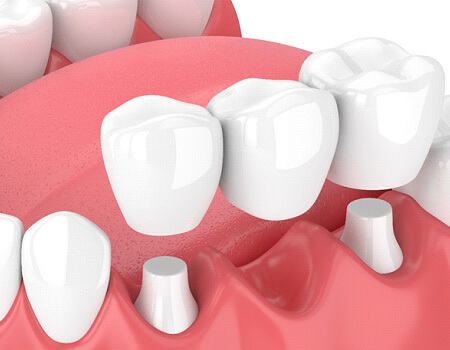
A traditional dental bridge requires healthy teeth on either side as the anchor and is typically suggested for those only missing one or a couple of teeth in a row. For the bridge to fit, we’ll need to reshape the underlying abutment teeth so that everything lines up correctly.
Implant Bridge
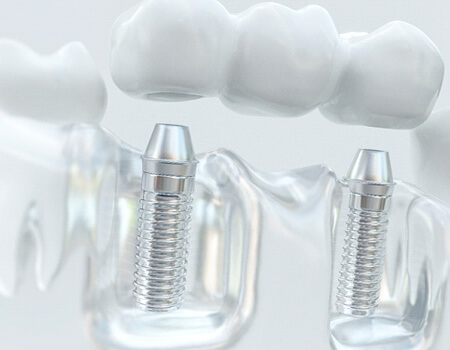
Implant bridges are often offered to patients who have lost three or more teeth in a row. Instead of attaching to surrounding teeth, we’ll surgically insert titanium rods into your jawbone to serve as support posts. This requires some patience because you’ll need to wait a few months for your mouth to heal after the procedure before your bridge can be placed. Many patients feel it’s worth the wait, however, to have a sturdier restoration.
The Benefits of Getting a Dental Bridge
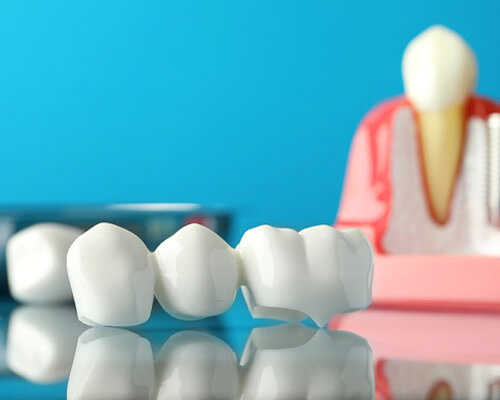
There are several advantages to getting a dental bridge, including:
- Maintaining the alignment of your remaining teeth.
- Enhancing your appearance by filling in the gap in your smile.
- Restoring your ability to chew and converse more easily.
- They’re easy to maintain with a consistent daily oral hygiene routine.
- They last up to 15+ years if cared for properly.
Dental Bridges FAQs
How Many Teeth Can a Dental Bridge Replace?
Typically, dental bridges are used to replace between one and four missing teeth. Any more than that, and the restoration can become unstable, compromising the strength of your bite in the process. If you’re struggling with more severe tooth loss, then our team at Elwood Avenue Dental will explore your other tooth-replacement solutions, like dental implants.
Do Dental Bridges Look Natural?
You’ll be happy to know that the answer is “yes!” That’s largely because the size, shape, and shade of each prosthetic tooth is tailored to your unique smile, ensuring it doesn’t look unnatural in any way. Equally as noteworthy, however, is the fact that dental bridges get support from the teeth surrounding the gap, which prevents it from moving around as you laugh, talk, and chew. Simply put, this tooth-replacement solution is natural in both look and function!
How Long Should a Dental Bridge Last?
Dental bridges usually last anywhere from 5 to 15 years. Since that’s quite the gap, you might be wondering how you can make yours last for over a decade. One of the best things you can do is adopt good oral hygiene habits, like brushing and flossing consistently. It’s also important that you don’t use tobacco products, that your diet isn’t loaded with added sugar, and that you come into our office every six months for a checkup so we can examine your restoration on an ongoing basis.
What Can You Not Eat with a Dental Bridge?
Whether you had one missing tooth or several missing teeth in a row, you’ll be happy to hear that a dental bridge can restore the strength of your bite and, in turn, allow you to enjoy a varied diet again. That said, we do recommend avoiding caramel, fruit gummies, and other sticky foods that can tug on your restoration. We also encourage patients to keep sugary foods and drinks to a minimum since they increase the risk of tooth decay.
Can Dental Bridges Get Cavities?
We briefly mentioned tooth decay in the previous question, which might leave you wondering if your dental bridge can get cavities. Since it’s crafted from dental materials like porcelain, the answer is “no.” However, your natural teeth still can, and your gums can develop an infection if you don’t care for your smile properly. That’s why we encourage every patient – even those who don’t have any of their natural teeth left – to commit to a solid oral hygiene regimen.
Are Dental Bridges Covered by Insurance?
Dental bridges typically are covered by dental insurance providers! Since your level of coverage will depend entirely on the fine print of your treatment plan, we strongly recommend reading it or calling the helpline to learn more about your coverage. Of course, we’re here to help too, so don’t hesitate to bring any questions you have to us!

